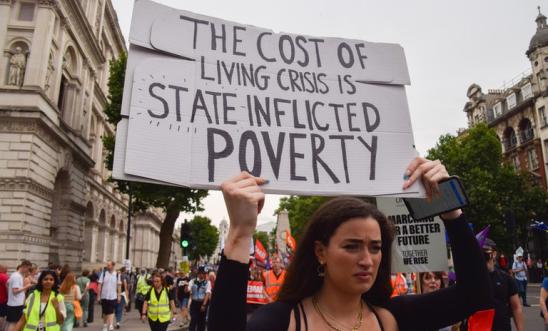
Press releases
UK: Government plan to push more anti-protest legislation through Lords must be stopped

Government is seeking to sneak rejected elements of the Public Order Act through the House of Lords next week
This is the first time the UK government has used these tactics to push through legislation that has already been voted down
New ‘regulations’ would set criminal threshold for protest at an astonishingly low level
‘Peaceful protest is clearly protected under international human rights law, yet the UK has entered a dangerous new era of authoritarian law making’ – Sacha Deshmukh
Amnesty International is alarmed by news that the UK government is seeking to pass yet more legislation to further clamp down on peaceful protest.
Clauses in the latest Public Order Act that were rejected by the House of Lords earlier this year are set to be snuck through parliament as “regulations” next week.
Shortly before the Coronation, the Government published new regulations relating to protest which were presented as a way to crack down on slow-walking protests.
However, the regulations being pushed through next week are even more far-reaching: providing a new definition of what “serious disruption” means - the threshold at which police can restrict protest - and setting it at an astonishingly low level for any “obstruction” that “causes more than minor hindrance to day-to-day activities”. Police restrictions can effectively ban a protest and breaching restrictions is a criminal offence.
These regulations will also allow police to impose restrictions on protests in advance of them taking place – that is, before any disruption has even occurred.
However, a debate and vote in the House of Lords due next week (pencilled in for 13 June) could prevent this punitive legislation being passed. Two motions have been tabled: a “regret” motion from the Labour Party, which criticises the regulations, and a “fatal” motion from the Green Party, which would stop the regulations entirely.
Sacha Deshmukh, Chief Executive of Amnesty International UK, said:
“Amnesty strongly urges all Lords who will be voting next week to get behind the fatal motion and reject these regulations in their entirety.
“Peaceful protest is very clearly protected under international human rights law, yet the UK has entered a dangerous new era of authoritarian law-making which is undermining our collective right to free speech and public assembly.
“The Government’s latest insidious approach to increasing police power underscores how it is hellbent on supressing protest – including finding underhand ways to do this when the proper avenues do not provide the results they wish.
“Amnesty calls on all peers to step up at a moment like this to ensure that yet more authoritarian and punitive laws are not passed. We welcome Labour’s criticism of the regulations, but they must go further by actually voting to stop them coming into effect.
“The world is watching how our Government deals with peaceful protest and if we pass regulations like those being debated next week, it will be another nail in the coffin of the UK’s reputation as a defender of freedom of speech and assembly.”
Peaceful protest under threat
In April this year, the highly controversial Public Order Bill was finally passed in the House of Lords. The bill introduced more powers to restrict people’s fundamental right to peaceful protest just months after draconian anti-protest measures were enacted in the Policing, Crime, Sentencing and Courts Act.
However, certain elements of the Public Order Bill (now Act) were rejected by the House of Lords because they were deemed too restrictive and had not been given proper consideration.
Undeterred, the UK government is now seeking to reinstate these additional laws but through a different process - one in which there’s even less consideration and which is more difficult for the Lords to oppose.
This is the first time the UK government has used these tactics to push through legislation that has already been voted down.
Amnesty is specifically calling on Lords to vote for the fatal motion as this would stop the new regulations coming into effect and avoid any further damage to the rights to freedom of expression and assembly in this country.